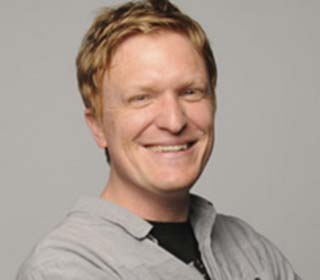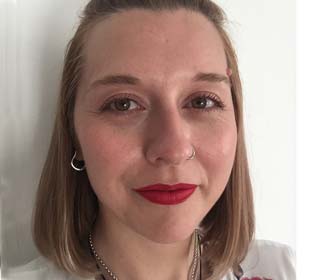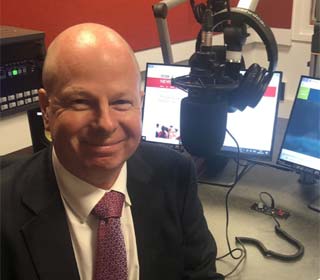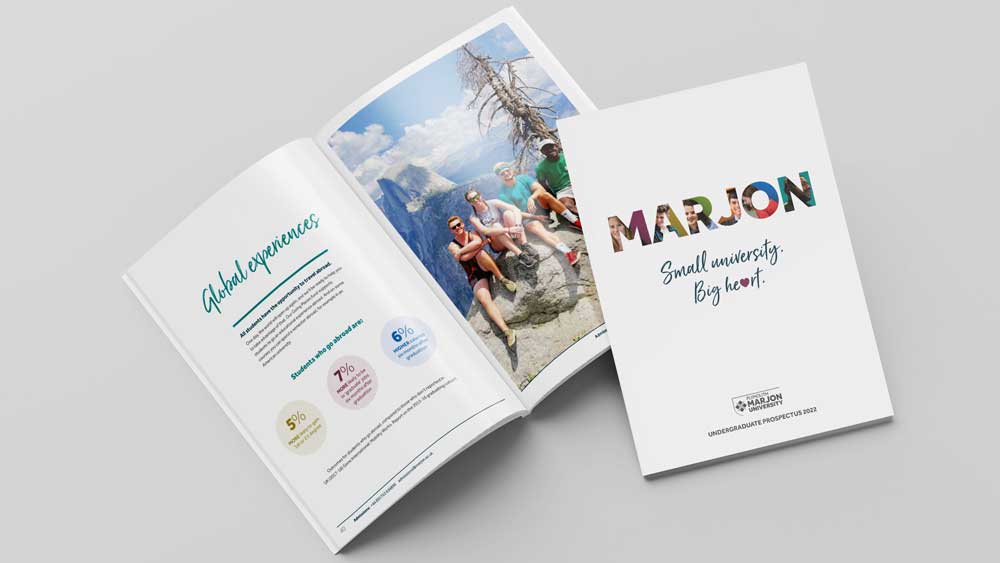
BA (Hons) Sports Journalism
Study on the BBC campus to fast-track your media career and work as part of our sports media team producing content for PAFC, Plymouth Albion and Plymouth Patriots.

Entry requirements
Three A-levels at grades CCC or above
Or BTEC triple grades MMM or above
Or Access 23-45 D/M with min 6D
Or T level P (C+)
And GCSE English Language at grade 4 or grade C or above
We will accept 2 AS levels in lieu of one A level but must be accompanied by 2 A Levels or BTECs (General Studies is excluded)
Applicants with other qualifications and/or experience will be considered on an individual basis
Any questions?
Contact Tara Godber, our Applicant Support Coordinator, if you have any questions. Email applicantsupport@marjon.ac.uk and Tara will get back to you.
Course Summary
Our BA (Hons) Sports Journalism degree gives you essential skills required by today's sports media industry. You’ll work closely with BBC South West in Plymouth alongside lecturers from Match of the Day, Sky Sports, ITV West Country, The Guardian, Plymouth Herald, regional and national freelancers, filmmakers and broadcasters.
Our new broadcasting hub, The Workshop, offers state-of-the-art TV and radio studios, on the BBC South West campus in Plymouth. Here you'll learn practical skills and work with experienced journalists and editors. Our third years are paired with a BBC mentor. One module is taught by BBC journalists, producers and digital filmmakers. You will have the chance to pitch story ideas to commissioning, online, sports, news and current affairs editors, and get their feedback on your work.
We also have a 24/7 radio station and online TV news channel on-campus. We can also stream and record podcasts, cover live events, host and broadcast live-lounge music gigs, plays and performances. You'll learn to write scripts for TV and radio, news bulletins, news cues for TV and how to structure radio and TV programmes. We’ll also teach you how to self-shoot for TV, record great audio, generate story ideas, and produce, direct and edit your own shows. You will have access to Apple devices, professional DSLR cameras and lenses, recording equipment and editing suites all loaded with the latest industry-standard software.
Students get regular work placements at Plymouth Argyle, Plymouth Parkway and Plymouth Albion. We also have excellent links with Exeter Chiefs and City, Torquay United and various teams and individual sportspeople across the region.
Why this course at Marjon?
Train in our world-class broadcast studios on BBC South West campus
Regular teaching input from experienced journalists
Great 24/7 facilities and free access to the latest kit
Small classes where staff can really help your work develop
Wide industry links to help you develop an amazing portfolio
Practical, hands-on delivery where you learn through doing
Modules for this course
Course Snapshot
“ The sorts of opportunity available to the students here at Marjon quite simply didn’t exist when I went to university; I would have absolutely loved it. You need extra attributes than those which are taught in the classroom – and they’re taught really well here.”
1st Year
Serious Skills
Fast News
Journalism in Practice
Making Headlines
Digital Storytelling
Journalism in Context
2nd Year
Investigative Journalism
The Hustle
Trending Now
The Big Show
Slow Journalism
Pod Sounds
3rd Year
And Finally…
The Winter Edition
The Newsroom
The Buzz Feeder
Big Show: Season Two
This course is perfect if you’re curious about these questions...
How do I tell sports stories online and in print?
What happens at a sports press conference?
What are the skills required of sports journalists right now?
How do I turn my sports blog into a career?
How will I make contacts that will help me stand out?
Where can I get the industry experience I need before I graduate?
“ The sorts of opportunity available to the students here at Marjon quite simply didn’t exist when I went to university; I would have absolutely loved it. You need extra attributes than those which are taught in the classroom – and they’re taught really well here.”
Ask a student
See where our graduates are now
Dan Cole
“One of the tutors took time out to help me with essay writing in the first weeks of the course. My first effort was, um, uninspiring, but I improved drastically with the support of the tutors. By the end of my studies, my final dissertation was put forward for publication. I do not believe that I would have improved at the same rate where the class sizes are bigger, and the staff less approachable.”
Dan is Communications Manager for Plymouth Argyle Football Club and Wimbledon Tennis Championship.
Sam East
“I didn’t think I’d be doing a job such as this straight away after uni - essentially I’ve got my dream job straight off the bat. I was pretty happy just to get an interview, they told me they had had hundreds of applicants from all over and I was the only recent graduate they interviewed. They just said they were really impressed with my interview, and I’d done everything I could to make myself stand out.”
Sam is Video Editor at Huddersfield Town FC (English Premier League).
Ali Alexander
"The lecturers are practicing what they are teaching so are enthusiastic and well connected. Marjon was great in terms of providing me with skills and confidence, and also gave me the confidence to talk into the microphone and really be myself for the listeners. I really felt ready for the workplace once I graduated."
Ali is a Presenter on X-Rhythms Radio.
What might you become?
We have a long list of graduates who have gone on to work in the sports media industry at newspapers, magazines, national radio stations and websites as well as in the press departments of professional sports clubs, and in the sports PR and marketing industry. Roles held by recent graduates include Digital Content Manager at Huddersfield Town FC; Media Officer at West Bromwich Albion FC; Media Officer at Plymouth Argyle; Data Analyst for IBM at Wimbledon; Sports journalist at Bath Chronicle; Sports Writer at Mid Glamorgan Press Agency; freelance sports journalist and film-maker.
Employability workshops, mentoring and work experience placements are integral to our BA (Hons) Sports Journalism programme; we know from working with and speaking to prospective employers that they like graduates to be well qualified and experienced.
How you’ll be taught and assessed?
How will you be taught?
Teaching includes workshops, seminars, tutorials and practical live news days which replicate the industry newsroom. Arrive in the morning and spend the day putting together a news programme for TV or radio or creating a magazine or daily newspaper.
How will you be assessed?
Assessment methods are based on the production of news stories, features and essays and you will be appraised on your performance on work placements.

Mike is an experienced journalist, who started his career at the Plymouth Herald and moved on to the sports desk at The Guardian, where he worked as a commissioning and sports night editor, while also appearing regularly on Radio Five and contributing to a number of other national newspaper and magazine titles. He has since worked as sports editor at the Western Morning News and as a broadcast journalist on BBC Radio Devon, while also teaching on the Journalism programmes at Marjon. He still works weekend shifts at The Guardian, bringing current industry expertise and contacts to his teaching practice. He said: “The industry changes all the time; we need to ensure our students are learning the skills they will need from day one, while also underpinning those with the traditional elements of journalism and storytelling which have never changed. We also have great fun while we do it.”
Fees and funding
Fees UK students: £9,535 per annum
Fees for International students: £14,600 per annum
This fee covers your tuition and access to course-specific equipment and facilities, as well associated services including access to the library, study skills support, IT support, student support and wellbeing services and membership of the Student Union. There may be additional costs by course.
Funding available for this course
Our Student Funding Advisors offer confidential and impartial advice about your funding options.
Learn moreLecturers

Dr Natalie Raven is a proudly working-class scholar and performance artist with over 15 years professional experience in industry, presenting and exhibiting her work across Europe and North America. She has teaching and research interests in: performer training; material and materiality in performance art; scenographic approaches to performance making; feminist performance (1960 - present); body-based performance practices; queer performance; semiotic and phenomenological approaches to performance making; re/presentations of self and identity in performance; site-specific performance in outdoor environments.

John Roder is a renowned and highly experienced broadcast journalist, and while most people will know him from his commentaries on BBC’s Match of the Day, he is also a regular voice on TV stations all around the world, having worked on every major football tournament you can think of. John has appeared on BBC, ITV, Channel Four, Five, BT Sport, Sky Sports, ESPN, Setanta Sports and Eurosport in the UK; and is frequently heard on Fox Sports, ESPN and beIN Sport. He teaches primarily broadcast skills to our students, from how to act in front of a camera, to live commentary and broadcasting techniques, voice training, podcast skills and more. John also brings a vast network of broadcast contacts, who regularly contribute to sessions with students.
Your schedule
In-person taught sessions two days a week which include live news sessions.
You will also be expected to work on assessments and practice for 10 hours per week in year one, rising to 20 hours per week in year three.
Course location(s):
- Marjon Campus
- The Workshop, BBC Plymouth Campus
Find out more about studying BA (Hons) Sport Journalism at Marjon

Discover Uni collects data about university courses in the UK. All universities publish Discover Uni data on their online course pages enabling you to compare similar courses at different universities.




